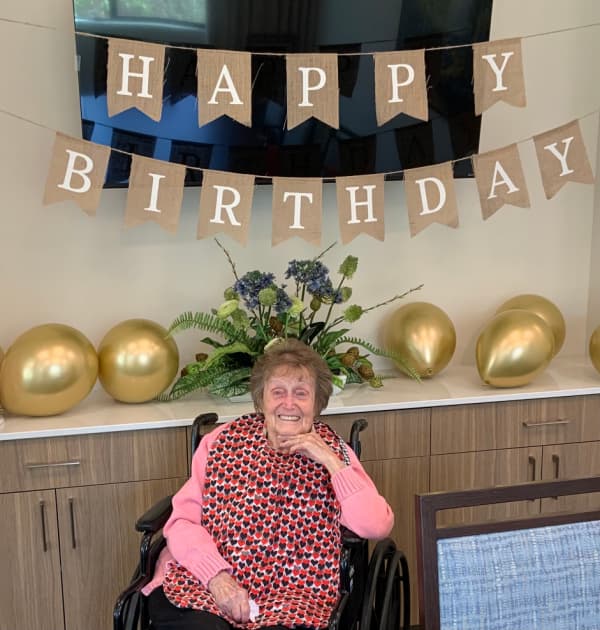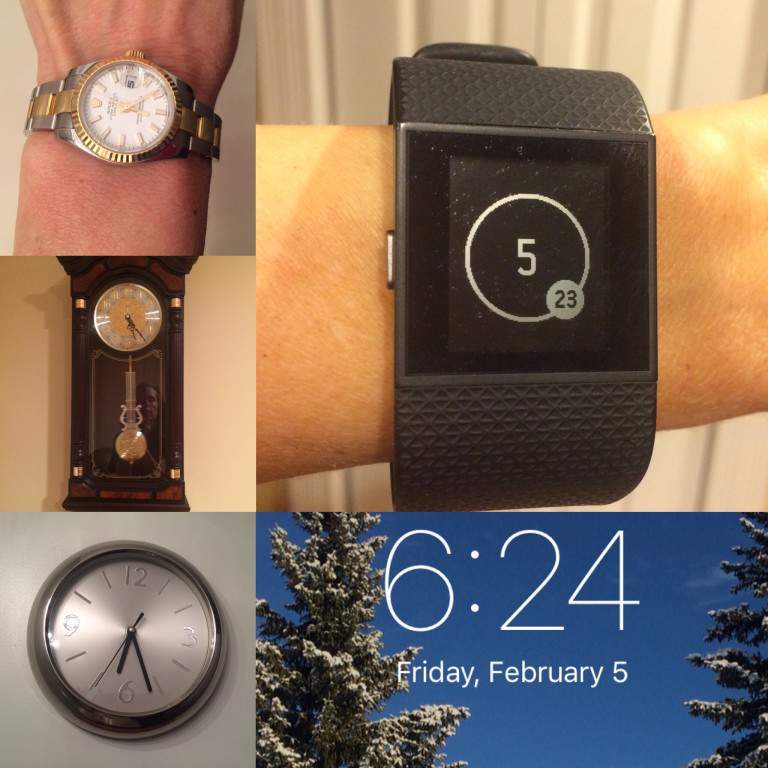3 things I learned from aging parents
My mother-in-law turned 95 this summer. She has seen and done a lot during those years. She raised three children, was a dedicated military wife, managed a bank branch, golfed, made friends she still has today… Of course, that is just the tip of the iceberg…a small sampling of what she has experienced in her near century of life.

As often happens with a long life, the last few years have brought a slowing and a narrowing of activity for Betty. Time has taken its toll. She can’t do many of the things she once enjoyed. Now her memories are slipping away too.
Watching our parents age is difficult. I’ve been through this before…a relatively quick decline with my father and father-in-law and a more prolonged slowing for my mother. It doesn’t seem to get any easier with experience.
Our concern and sorrow for our parents is compounded by the fears their aging raises about our own lives. We are reminded of our own mortality…and perhaps more frightening, our inevitable decline, should we be so lucky to live out a rich, long life.
3 things I’ve learned from my aging parents
I’ve learned so much from having the privilege of caring for my parents and in-laws as they age. These three things stand out in the moment.
1. Take care of your mind and body now.
The time to prepare is now. Building your strength, flexibility, balance, and brain function today will help you enjoy your independence and all the experiences this life has to offer for as long as possible. Genes and fate play a role in how healthy you are and for how long, but why not give yourself every advantage? It’s not just the hand you are dealt, but how you play that hand.
And while you are at it, appreciate your mind and body for the amazing things they can do, rather than focusing on what you might see as faults or weaknesses. I don’t want to look back and regret not appreciating a fully-functional, but slightly droopy or creaky, body while I had it.
2. Do what you want to do now.
There’s no time like the present. If there are things you want to do, places you want to go, things you need to say…do them. Of course, we have to prioritize things in our life. Some things cost money. Everything requires some level of time and energy. All of which are finite. Just make sure that your desires are given proper priority. We are not promised tomorrow, and we are worthy of life’s fullness.
And make sure you are fully present for those experiences…truly appreciate them. It doesn’t do any good to take that vacation if you are so worried about logistics, or disappointed by weather, or planning for the return home that the experience itself escapes you.
3. Learn to sit in peace with stillness now.
The time may come when your sight, hearing, and speech fade. Memories may dim. Even your thoughts may fail you. Obviously, I cannot speak to what that experience is like, but I can’t help but feel that learning to sit in peace with the stillness now might ease that transition. One more reason to practice meditation.
I recently read a Facebook post by Timber Hawkeye that really hit home for me.
Even though sitting doesn’t immediately change your life (just like one visit to the gym doesn’t make you lose weight), if you commit to sitting regularly, you will eventually find yourself consciously choosing not to stress in the middle of stressful situations, and remaining calm even when surrounded by annoying people. Most of us spend our lives trying to avoid those who push our buttons, and we often get mad at them when they do. But the incentive of mindfulness practice is to get to a place where we no longer have any buttons that can be pushed.
~Timber Hawkeye, The Opposite of Namaste
I believe if you sit regularly, you will also eventually find yourself at peace with the stillness.
Your turn
Those are the three things I am working on now. I know there are other lessons to be learned, and I’d love to hear your thoughts on the subject. Here are some questions to get the conversation started. Please feel free to disregard them and share anything else that comes to mind.
- Have you been through the experience of aging parents, and if so, what lessons can you share with the rest of us? Or do you have questions we may be able to answer for you?
- What is one thing you definitely want to do in this lifetime? Is there something you can do today to bring it to fruition?
- What do you consider an indispensable part of caring for your physical and mental health?
- Do you meditate regularly or participate in other mindfulness practices?







I have, and still am, dealing with aging parents. Other than the three things you’ve listed, which I definitely agree with, I’d say I’ve learned that you must accept your aging. If you fight it or deny it, you’ll either hurt yourself or be constantly frustrated. There’s no shame in being old and no one will think anything if you show up with a walker or need to move to a place that’s safer. I know I’m one who’s been affected by this whole experience and forced to think about my own life’s future. But I also think I’ll be more realistic about things when I get there. At least I hope so. ?
Great advice, Linda. We should be proud of our experience and our longevity and definitely take advantage of resources like walkers and hearing aids. My mom fought moving out of her beloved condo, but once she did and she was getting the daily assistance she needed, she thanked us for pushing her to that decision. Like you, I hope I will remember and learn from my parents’ experience. Sending you best wishes for your current situation.
Hi, Christie – I am also currently assisting aging parents and relatives. I found your three tips to be spot on. Another tip to add is Take a Step Back and Ensure We Are Honouring Our Loved Ones Desires (Not Our Own). This is the most important lesson that I have recently learned.
That is a good point, Donna. Thanks for sharing that. Sending love to you and your family.
Great question. My parents were older and passed on earlier than my peer’s parents. From that experience I learned the value of accepting what is, learning to NOT get what you wanted, but appreciating whatever it is that gives you joy.
That’s a valuable lesson to learn early on, Ally. Accepting and appreciating what is makes life more enjoyable and richer for sure.
Hi Christie, a poignant post reminding us that “none of us go on forever”. Thank you for sharing.
I am 73 later this year and my husband is 74 early next year. We have noticed even with the greatest will in the world, that our physical limitations are slowing us down and that fact that we are OWNING up to it is indicative we don’t have our heads In the sand!
Recently we made the decision to move BACK to Sydney (near where we lived for decades) from the Central coast, a regional area, because we know we don’t need a house with yard and lawn to care for, & we will be closer to family (have missed those more immediate connections in 8 years) and greater health facilities.
We have both had and now manage several chronic health conditions but we remain alert, positive and laugh each day! My husband’s habits include playing music, a daily walk & crosswords & jigsaws….and I do daily meditation via calm morning & night. My art is my go to for fun…
Now, about what May lie ahead for us both! B’s parents lived pretty long lives and my mum died at 82 (cancer) but my Dad is 98 & 7 months..,and he would say his quality of life has deteriorated big times BUT he accepts each day as it comes & still self cares almost 100%. I take after him in many ways, and as he is almost blind from macular degeneration I am aware I have 1 in 2 chance of that happening for me and get regular checks.
We are retirees who ended up with no home of our own (regrets include giving our kids help with mortgages) and with some savings but travel can not happen for us due to our physical limitations and $$$.
Yet, here we are, almost 52 years wed and content, laughing each day, and sharing memories of our decades teaching and helping raise some of our 8 grandkids who are now aged from 25 to 7!
Life
Is
Good!
Denyse
Life is good, Denyse, and it sounds like you have a handle on things…that you appreciate what you have and are not unrealistic about your situation. It makes me happy to read about you and your husband, your 52 years of marriage, being content, close to family, and laughing a lot. And I am so impressed that your father is still primarily caring for himself as he approaches 99. Thank you for sharing your experiences with us.
Hi Christie – I’m drawing a lot of these conclusions too from watching my own mum and MIL – one is active, engaged, and easy to be around….the other has become isolated, ‘whiny’, and less likeable.
I don’t want to be the person who people are more relieved than sad about when they pass away – and to do that, it means staying as well as possible, being interested in other people, maintaining friendships and interests, utilizing support services and social groups, living in a home you can manage, being grateful for your blessings, being content with your own company, and not expecting your family to be your constant source of support…..You can see I’ve given this a lot of thought lately! Gratitude and focusing on the good stuff never grows old 🙂
I couldn’t agree more, Leanne. Gratitude and focusing on the good stuff are key to enjoying life and aging positively. It’s important to take care of our bodies to remain physically and mentally sharp, but it is just as important to maintain relationships, interests, and a grateful mindset. I am thankful that my parents and in-laws set a good example that way.
Christie, I’ve experienced three kinds of parental-passing, so far. The immediate drop-dead (literally) which shocks everyone, the pull-the-plug (literally) which causes everyone to wonder if-only (and caused us a major life path switch overnight), the long-drawn out failing where you actually pray for the end because they are in so much pain. Now, I’m dealing with cognitive decline with my mom who always highly valued her intelligence and capability. All are so hard and made me wish for a passing in my sleep when I’m losing my capability. But I think the deaths that made even more impact were two siblings, recently. Yes, my husband lost 2 siblings in the last 4 years. That loss made me move full-time to Florida. It was Tim’s dream and I finally realized I would never forgive myself if I continued to stand in the way of his realizing it. A definite “do it now” what I learned!
There is no easy way to lose a parent, is there, Pat? My father made the decision to stop his dialysis and decrease his oxygen, which he knew would cause his death. I’m glad he was able to make the final choice and that we were able to sit with him in his last days. I was holding his hand as he took his final breath. My mother suffered cognitive decline over a somewhat extended period and then had a rather rapid physical decline. Ultimately, she died in her sleep the day after Christmas. While no one was there in the moment she passed, the timing meant that all her children and grandchildren were in town for the holidays, so everyone got to spend time with her in the days leading up to her death. I wish you all the best with your mother.
My heart goes out to your family for the loss of your husband’s two siblings. As you may know, I lost my younger brother in a sudden accident seven years ago. It is devastating and life-changing. Losing a loved one, especially at a relatively young age, definitely reminds you about the fragility of life and the need to “do it now,” whatever it is for you.
I agree with these three things as well. I found the one about learning to listen and be still especially interesting, as I’ve never thought about that. Having the same parents as you (other than in-laws) my experience with them aging has been very similar to yours. I’m glad we’ve had each other to lean on. ❤️
I agree, Cindy, having a close family to share the responsibility and the emotions makes a world of difference. We are lucky that way. I love you.
I had the privilege of caring for my parents as they reached the end of their lives. Although it wasn’t easy seeing them becoming frail and struggling, I am confident they both died with few regrets. They were life-long learners, travelers, and had loving friends and family. None of us will get out alive, live your best life NOW.
Well said, Janis. You can’t ask for more than that.
Christie, I don’t think I have left anything undone and am satisfied with where I am at this stage of life. I plan to continue to travel, read, express my creativity in whatever way possible, make new friends, exercise, and narrow my life but not abandon it going forward.
Some promises I have made to myself – I will get a hearing aide, I will use a cane or walker if need be and I will not think I have all the answers. I will be kind and always express gratitude. I will communicate my wishes to those responsible for my well-being and accept when I can no longer be.
Something Donna said hit home with me – “make sure we are honoring the desires of our loved ones and not our own.” That has been hard to do in our case, with my MIL in cognitive decline but not to the point of being helpless. Witnessing the stress and pressure on my husband is excruciating, but as an only child, he feels obligated to do it her way. Unfortunately, she seems unaware of all that he does to enable her to live as she wishes and is unwilling to discuss any alternatives. I know at some point we will hit a crossroads.
Difficult topic. Thanks for offering your insights.
That’s beautiful, Suzanne. If one can say they are satisfied with their life and looking forward to the future, that’s a wonderful thing. When it comes to honoring the desires of our loved ones, it is complicated when the loved one is in cognitive decline. Their desires have to be balanced with our own needs and the ability to also care for ourselves. I’m sending love and best wishes to you, your husband, and your MIL. That is a difficult situation.
What a question you raise.
I have lived through caring for aging/ill parents–my mother and mother-in-law. Now, I look around and, wow, my husband and I are the elders.
What I learned from the way my mother and MIL’s lives ended is this: Don’t wait until you are infirm to put your papers in order. And by papers I don’t necessarily mean legal documents. I mean memorabilia and photos and letters that hold meaning for you and your family. Neither of our mothers was able to do that, which meant that when we had to clean up and clear out their apartments we were unable to save all the meaningful family treasures they had accumulated.
I am trying to put my treasure-house in order.It is the least I can do for my son, daughter and grandchildren.
As I’ve written before, Our legacy to our children consists of three parts: One is our worldly goods which may have a monetary value. Two is a sense of our values and history. Three is clean closets.
Such good advice. My husband and I are working on #3. We have a long way to go before everything is in order, but we are getting there. It is strange to be the oldest living generation in the family.